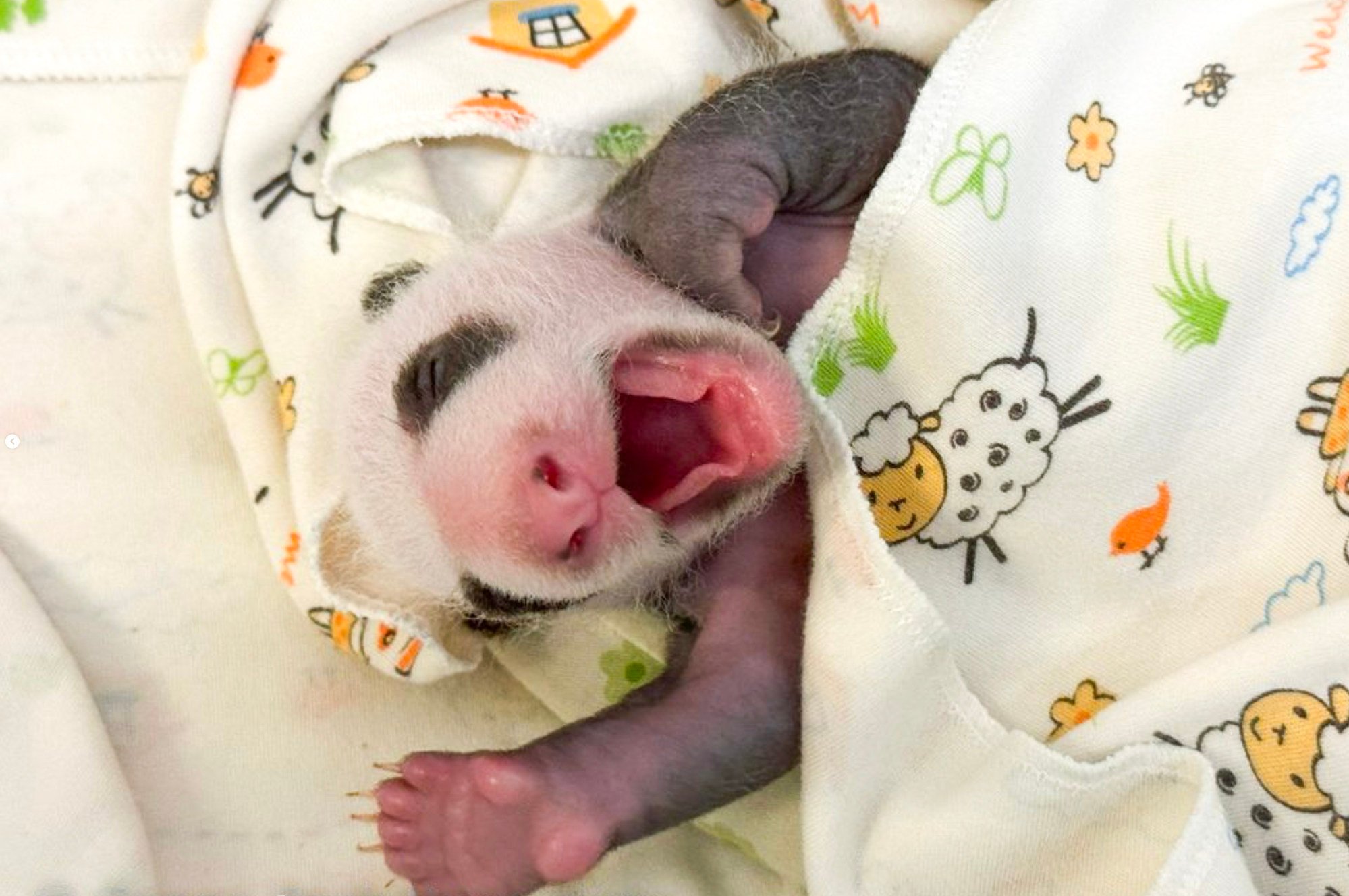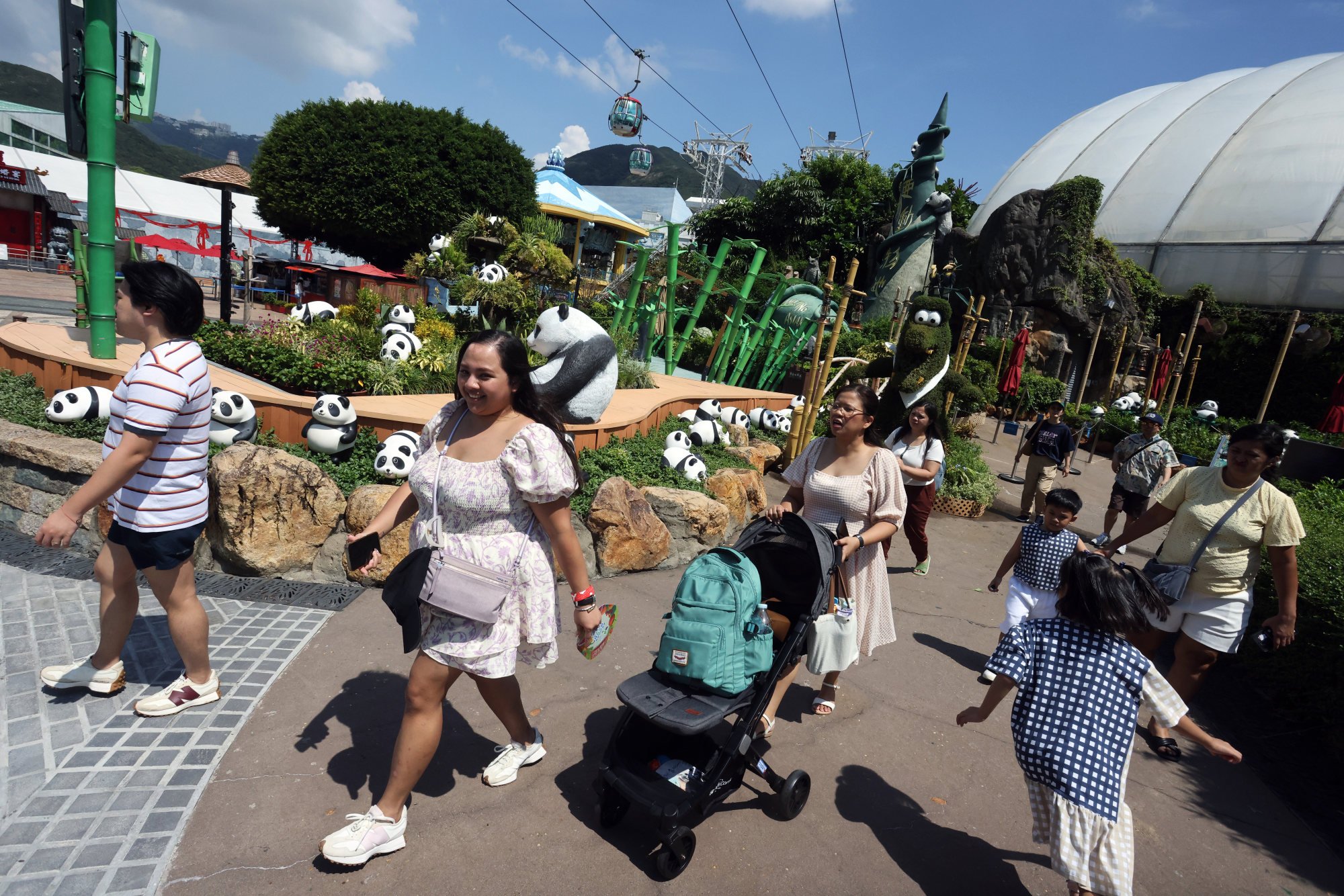Visitors who cannot wait to meet Hong Kong’s two panda cubs in person may be able to watch them online first, with Ocean Park’s chairman revealing a proposal to conduct live broadcasts is being considered.
In an interview with the Post, chairman Paulo Pong Kin-yee said the park was also planning crowd control measures before the arrival of a separate pair of adult giant pandas gifted by Beijing.
The Post reported earlier the pair would arrive on September 26 and undergo at least 30 days of quarantine.
Do you have questions about the biggest topics and trends from around the world? Get the answers with SCMP Knowledge, our new platform of curated content with explainers, FAQs, analyses and infographics brought to you by our award-winning team.
Pong said ticket prices would be unchanged despite the extra financial burden of caring for four more pandas, in addition to the current two, and he hoped the bears would help the city’s tourism sector.
“In terms of the live broadcasts [of the baby giant pandas], we’re still discussing with the team and we will make a decision soon because we know there is a lot of interest from the public to see them,” he said.
No date has been set for the cubs to meet the public, but the park chairman said they might be ready in the first quarter of next year.
More time was also needed to observe their individual characters before considering potential names, he noted.

The names for the adult pair arriving later in the year are likely to be selected by a panel formed by the government, with suggestions from the public among the options.
“We’re keen to make this panda economy work for us, and hopefully to help increase visitor numbers in Hong Kong as well, because we know that pandas can definitely help with tourism,” he said.
The chairman did not provide details of any collaborations the park was considering, but said it was open to input from Hong Kong and the region to “come up with new ideas” to “bring revenue to the park”.
“With people talking about the panda economy, we will directly benefit because we hope that more people will come and visit, whether they are locals or overseas visitors,” he said.
He conceded that taking care of six pandas would add to the park’s financial pressures but said the fresh arrivals would “create opportunities”.
Pong urged authorities to continue or even step up their financial support of the park, saying it would also seek out corporate sponsorships and donations to build new facilities.
“We’re going to run out of space in, say, two years’ time because the little cubs will need their own space,” he said.
“That will be the most immediate financial pressure, but otherwise we see it as a very positive impact on the park.”
Panda-related goods and activities are also in the works.
The public can expect themed food and drink products, as well as “a spectrum of programmes” such as performances and drone shows, according to Pong.
“In terms of scale, location and music, I think there are many different ways to make it different from other drone shows,” he said.
“We want to keep this momentum, we want to do it while people are still very much aware of these new pandas ... so we can boost Hong Kong tourism.”
He said prices would stay the same because it was “an honour” to host the pandas and the arrival of new bears was a “joyful occasion for Hong Kong and Ocean Park”.
“We want to make sure people will get to come and visit,” he added. “We [also] believe it’s a social responsibility. We’ve been working very hard on educating people about our conservation work, the nature side and the ecology of Hong Kong.”
A one-day pass to the park costs HK$498 (US$64) per adult and HK$249 per child. Discounts are available for visitors with disabilities and people aged 60 or over.
Pong said the public would be able to meet the new adult pandas at the “end of the year”, but attendance might be arranged in time slots “in the first month or so” as the bears needed time to get used to visitors.
“We don’t want to scare them,” he said.

New plants and climbing frames have been installed in the areas where the late An An and Jia Jia lived in preparation for the arrival of the new adult pandas from Sichuan province.
“We have also sent our team up to Sichuan to work with the two pandas that are coming. They are getting used to each other so they will adjust to the new environment well,” he said.
“We even sent our own bamboo leaves, so that they will get used to eating our type of bamboo leaves because they’re different types. The ones they serve in Sichuan are different from the ones we have here from Guangdong.”
The park is not planning to increase the number of panda carers on staff.
Hong Kong welcomed two baby pandas last month after giant panda Ying Ying gave birth to a pair of twins, a male and female. She became the world’s oldest first-time giant panda mum at 19 years old or 57 human years.
The cubs arrived a month after Beijing announced the gift of two pandas on July 1, the 27th anniversary of Hong Kong’s return to Chinese rule.
More from South China Morning Post:
- Panda Watch: tracking the growth of Hong Kong’s baby panda twins
- Hong Kong to welcome new pair of giant pandas on September 26
- Close watch on Hong Kong’s new panda mum Ying Ying as food tastes change after birth of twins
For the latest news from the South China Morning Post download our mobile app. Copyright 2024.





